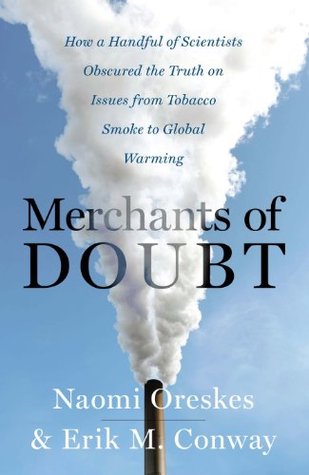More on this book
Community
Kindle Notes & Highlights
Read between
November 8 - November 28, 2018
One of these groups, the Heritage Foundation, grew directly out of the SST debate of 1971.59 Two days after the crucial congressional vote killing the SST, the American Enterprise Institute had provided a briefing supporting the project. This wasted briefing infuriated a pair of Republican congressional aides, who started a new foundation intended to provide a “quick response capability” in support of conservative, “probusiness” policy objectives. The two gained their start-up funding from Joseph Coors and Richard Mellon Scaife.
One aspect of the effort to cast doubt on ozone depletion was the construction of a counternarrative that depicted ozone depletion as a natural variation that was being cynically exploited by a corrupt, self-interested, and extremist scientific community to get more money for their research. One of the first people to make this argument was a man who had been a fellow at the Heritage Foundation in the early 1980s: Fred Singer.
we could continue to burn fossil fuels without restriction and deal with the consequences through migration and adaptation. Schelling noted that past human migrations “to and throughout the new world subjected large numbers of people—together with their livestock, food crops, and culture—to drastically changed climate.
Schelling acknowledged that these historic migrations occurred in eras with few or no national boundaries, very unlike the present, but he nevertheless suggested that adaptation would be the best response.
The fact is, historical mass migrations had been accompanied by massive suffering, and typically people moved under duress and threat of violence. So Nierenberg’s cavalier tone, and suggestion that these migrations were essentially benign, flew in the face of historical evidence.
As for migration, “does the Committee really believe that the United States or Western Europe or Canada would accept the huge influx of refugees from poor countries that have suffered a drastic shift in rainfall pattern?,” Weinberg demanded. “I can’t for the life of me see how historic migrations, which generally have taken place when political boundaries were far more permeable than they are now, can tell us anything about migrations 75 to 100 years from now when large areas lose their capacity to support people. Surely there will be times of trouble then.”
the mass media became complicit, as a wide spectrum of the media—not just obviously right-wing newspapers like the Washington Times, but mainstream outlets, too—felt obligated to treat these issues as scientific controversies. Journalists were constantly pressured to grant the professional deniers equal status—and equal time and newsprint space—and they did. Eugene Linden, once an environment reporter for Time magazine, commented in his book Winds of Change that “members of the media found themselves hounded by experts who conflated scientific diffidence with scientific uncertainty, and who
...more
Imagine providing “balance” to the issue of whether the Earth orbits the Sun, whether continents move, or whether DNA carries genetic information. These matters were long ago settled in scientists’ minds. Nobody can publish an article in a scientific journal claiming the Sun orbits the Earth, and for the same reason, you can’t publish an article in a peer-reviewed journal claiming there’s no global warming. Probably well-informed professional science journalists wouldn’t publish it either. But ordinary journalists repeatedly did.
The Heartland Institute is known among climate scientists for persistent questioning of climate science, for its promotion of “experts” who have done little, if any, peer-reviewed climate research, and for its sponsorship of a conference in New York City in 2008 alleging that the scientific community’s work on global warming is a fake.75 But Heartland’s activities are far more extensive, and reach back into the 1990s when they, too, were working with Philip Morris.
But not every “side” is right or true; opinions sometimes express ill-informed beliefs, not reliable knowledge. As we’ve seen throughout this book, some “sides” represent deliberate disinformation spread by well-organized and well-funded vested interests, or ideologically driven denial of the facts.
It does not make sense to dismiss them just because some person, somewhere, doesn’t agree. And it especially does not make sense to dismiss the consensus of experts if the dissenter is superannuated, disgruntled, a habitual contrarian, or in the pay of a group with an obvious ideological agenda or vested political or economic interest.


